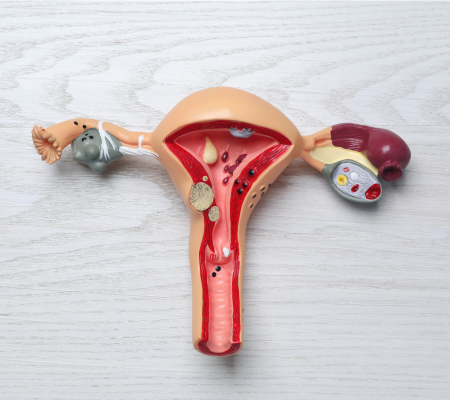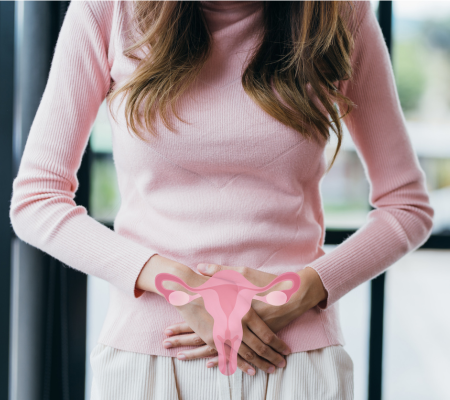
Infertility Causes
Causes of Infertility
No matter what may be the cause of infertility, if diagnosed and treated timely, you can always increase your chances of getting pregnant. For this, you need to see a fertility expert who can diagnose the cause, provide you with the best treatment options, and prepare you for your journey to parenthood.
- Age and lifestyle: The chances of conceiving a baby decline as both men and women age, hence affecting the health of the mother as well as the fetus. While females are most fertile in their 20s, their fertility begins to decline gradually in their early 30s. Yet, they still can conceive without major issues through their 30s. In the late 40s, however, their fertility declines significantly, making it difficult for women to conceive naturally and increasing the risks of miscarriage and chromosomal abnormalities, such as Down Syndrome. Male fertility begins to decline approximately around the age of 40-45 years.
Male fertility factors decrease the probability of conception. As a result, women could take a longer time to achieve pregnancy. Children born to older fathers can be vulnerable to the risk of mental health issues in later life. Declining female fertility can decrease ovarian reserve (i.e. the number and quality of eggs decline), decrease cervical mucus (which helps sperm in reaching the egg), and increase the risk of complications during pregnancy (gestational diabetes, high blood pressure, pre-term birth). However, it’s important to note that fertility varies from one individual to another, and some women may still conceive.

- Lifestyle factors can impact both male and female fertility. Your dream of becoming a parent may not be fulfilled if you do not change some habits which actually may be the root cause of your infertility. So it is very important to see a Fertility Specialist in order to detect it timely. Some factors which we can manage at Vardhan include:
Smoking can lead to low sperm count and increase DNA damage to sperm in males. While in females, it can disrupt hormone levels, affect egg quality, and increase the risk of miscarriage. Likewise, excessive alcohol consumption decreases testosterone levels, affects sperm quality, and causes erectile dysfunction in men.
Similarly, in women, it can disrupt hormone levels, affect ovulation, and increase the risk of miscarriage. Unhealthy weight – Whether it be too high or too low – can affect the fertility of both partners. Obese women are likely to have problems from conception to delivery, meaning it reduces their chances of conceiving naturally and also treatment like IVF will be less likely to succeed. Obese men can have 50% less sperm count, may not have normal hormone levels, and may suffer from erectile dysfunction. Poor diet with excessive processed foods, trans-fat, and sugar may impact fertility in both men and women. Along with diet, exercise also plays a vital role in fertility. Excessive exercise can disrupt hormone levels in women, upsetting their menstrual cycles disrupting ovulation. Meanwhile, in men, intense exercise may temporarily reduce sperm production. Stress is not good for the overall well-being of both men and women. It can adversely impact their fertility, causing an imbalance in hormone levels and impacting ovulation in women and decreasing sperm count in men.
Whether it be due to age or lifestyle, you can overcome fertility challenges by consulting your fertility specialist at Vardhan who are ever well-equipped to provide personalized advice and treatment options to you.
- Blocked fallopian tubes: In most cases, blocked or damaged fallopian tubes can be a significant factor leading to female infertility. This prevents sperm from meeting an egg and fertilizing it, or it can block the path of the fertilized egg to the uterus where it implants. Approximately, 20% of female infertility can be due to problems in the fallopian tubes. Fallopian tubes can be blocked due to pelvic inflammatory disease (caused often due to sexually transmitted infections – STIs), endometriosis, pelvic surgeries, and uterine fibroids.
 Most of the women do not show any symptoms for blocked fallopian tubes. However, some may have chronic pelvic pain, painful menstruation, or pain during intercourse. This can be diagnosed through procedures like Hystero Salpingo Graphy (HSG), Sono Salpingo Graphy (SSG), or laparoscopy. If just one fallopian tube is blocked you may still succeed in conceiving naturally with the help of assisted treatment like Ovulation Induction or artificial insemination (Intrauterine insemination – IUI). If both the tubes are blocked, your doctor may recommend laparoscopic surgery to clear the blockage or suggest In Vitro Fertilization (IVF) as this directly places your fertilized embryo into the uterus. However, the treatment option completely depends on the underlying cause and severity of the blockage.
Most of the women do not show any symptoms for blocked fallopian tubes. However, some may have chronic pelvic pain, painful menstruation, or pain during intercourse. This can be diagnosed through procedures like Hystero Salpingo Graphy (HSG), Sono Salpingo Graphy (SSG), or laparoscopy. If just one fallopian tube is blocked you may still succeed in conceiving naturally with the help of assisted treatment like Ovulation Induction or artificial insemination (Intrauterine insemination – IUI). If both the tubes are blocked, your doctor may recommend laparoscopic surgery to clear the blockage or suggest In Vitro Fertilization (IVF) as this directly places your fertilized embryo into the uterus. However, the treatment option completely depends on the underlying cause and severity of the blockage.
- Endometriosis: Endometriosis is a medical condition in which the same cells which form the lining of the uterus (endometrium) grows outside the uterus. Studies indicate 10% of women suffer from this and can develop such symptoms as pelvic pain, heavy menstrual bleeding, heavy and/or irregular periods, back pain, and painful intercourse which can result in infertility.

Initial diagnosis of endometriosis can be done through ultrasound. But an accurate diagnosis can be done by laparoscopic procedure. The scar tissue can be removed during the laparoscopic surgery while preserving the uterus and ovaries. In case of severe endometriosis, oophorectomy (removal of one or both ovaries) may be recommended. People diagnosed with endometriosis can still conceive provided it is treated properly and pregnancy is planned under the supervision of a fertility specialist.
- Polycystic Ovary Syndrome (PCOS) – PCOS is a hormonal disorder and it accounts for approximately 40% of female infertility. This is the most common hormonal disorder seen in females of reproductive age. This can be due to a combination of genetic and environmental factors. Insulin resistance (how your body processes glucose and insulin) is often associated with PCOS. Symptoms may include irregular periods with very light or very heavy bleeding, excessive bodily hair growth, acne, hair loss from the scalp, weight gain and difficulty in losing weight, darkening of skin specially along the neck, in the groin, and underneath breasts, pelvic pain, and difficulty in getting pregnant.

Above all other health issues, PCOS is a major cause of female infertility, and the main reason for PCOS being co-related with infertility is that it causes hormone and insulin imbalance. Hormonal imbalance in PCOS is a result of increased levels of male hormone (usually all women have low levels of male hormones) and this prevents ovaries from releasing eggs, which leads to irregular periods. When insulin in your body is not balanced your body cannot regulate your blood sugar levels. And thus higher levels of insulin can affect ovulation and decrease the chances of getting pregnant.
PCOS can be managed through diet changes and exercise after which it is possible for you to conceive naturally. If not there are other options for fertility treatment which can assist you to conceive a baby. Always seek advice from your doctor.
- Recurrent miscarriage: Miscarriage can happen due to various reasons, namely, chromosomal abnormalities in the fetus, hormonal imbalance, infections, uterine abnormalities, maternal health conditions (diabetes or thyroid disorders), or even lifestyle choices such as smoking and excessive alcohol consumption.
 If you have a history of miscarriage, this may lead to tubal infections which may cause infertility. Repeated curettage of the endometrial cavity may cause Asherman’s Syndrome which may result in infertility.
If you have a history of miscarriage, this may lead to tubal infections which may cause infertility. Repeated curettage of the endometrial cavity may cause Asherman’s Syndrome which may result in infertility.



